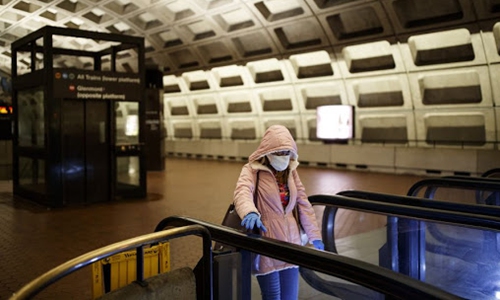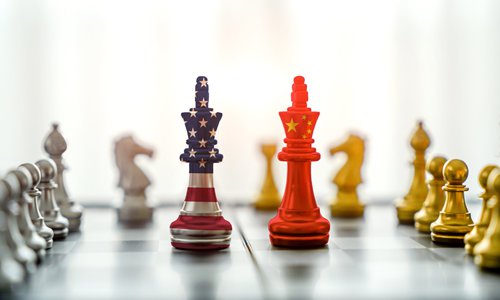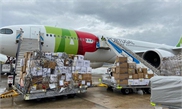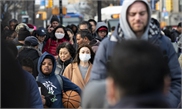 |
| https://www.bloomberg.com/graphics/2020-coronavirus-cases-world-map/ |
 |
| Zhong Nanshan |
https://youtu.be/UILmnQNeDuE
https://youtu.be/qYosR39XT7w
https://youtu.be/yYQz3dI65IQ
In an interview with CGTN on April 3, China's top respiratory scientist Zhong Nanshan said lockdown measures adopted by some countries in Europe or the United States are not effective as they are not exactly implementing real lockdown. He said that the lockdown should go deeper and be stricter, stressing the importance of social distancing to stop the spread of the coronavirus. "Nobody can block, can stop the spreading or stop the infection of this kind of disease. But we can try to do our best to inhibit the spreading. So, that's what we are successful," he added.
US must take more stringent containment measures: top respiratory expert
"I am now gravely concerned with the epidemic in the US, and if it gets worse, it will become a global problem," Zhong said on Thursday night during a COVID-19 international experience sharing and exchange video conference.
Zhong said that he noticed a significant increase in the number of COVID19 patients in the US over the past few days, suggesting that the country has begun mass screening of its citizens.
Screening in the US is progressing very advanced, Zhong noted. It takes about 15-20 minutes for a patient to get test results, while it currently takes an hour and a half in China, he said.
"US has made much progress in testing and determining the infected patients, but tracing all their close contacts, separating them, isolating them and cutting the transmission chain is much important," Zhong said.
Zhong urged the US federal government to adopt stronger measures to stem the spread of the pandemic in the US.
The US has reported more than 241,000 cases as of late Thursday, almost a quarter of confirmed cases in the world, and more than 5,800 deaths.
Source link
COVID-19 cases in US top 300,000: Johns Hopkins University
The number of COVID-19 cases in the United States topped 300,000 by 3:40 p.m. local time Saturday (1940 GMT), according to the Center for Systems Science and Engineering (CSSE) at Johns Hopkins University.China, US cooperation key to battling coronavirus, restarting global economy
Whether the US and China can now pivot toward collaboration where interests overlap will shape the degree of global cooperation with regard to both more effectively combating the coronavirus and no less, in the huge challenge of restarting the global economy.China's test kit providers call on world to stop smearing Chinese assistance
Chinese coronavirus test kits are desperately clamored for by many foreign clients, but some unfriendly Western media outlets have chosen to smear and discredit made-in-China products.Westerners should embrace use of masks: Global Times editorial
Masks can help prevent people from being infected. The suggestion is scientific and Asian countries have a lot of experience in this regard. However, excessive cultural confidence has hindered the US and European countries from giving due attention to the experience of their Asian counterparts.Ignorance is bliss
However, the kind ailing that United States' top brass has come at a devastasting cost to the Uncle Sam
https://youtu.be/sdre7SOd2hg
A news report appeared in the New York Times a week ago. It was probably glossed over, even in the Big Apple, as most New Yorkers struggle with overnight unemployment and keeping a roof over their heads.
It was conspicuously absent from CNN’s newsfeeds, too, despite its world-wide audience, as it remains preoccupied with ridiculing President Trump, while Fox News was per-script in blaming the virus on China.
Most of us outside the US were expectedly unaware of this significant event.
But on March 29, the NY Times reported about a commercial aircraft carrying 80 tonnes of gloves, masks, gowns and other medical supplies from Shanghai, touching down in New York last Sunday, marking the first of 22 scheduled flights that White House officials say will supply much-needed goods to the US by early April.
The NY Times is a credible 169-year-old American newspaper with a worldwide influence and readership. It has won 127 Pulitzer Prizes – more than any other newspaper.
The report quoted Lizzie Litzow, a spokeswoman for the Federal Emergency Management Agency, who said the plane delivered 130,000 N95 masks, 1.8 million face masks and gowns, 10 million gloves and thousands of thermometers for distribution in NY, New Jersey and Connecticut.
Apparently, there should be subsequent flights to Chicago and Ohio, where supplies will be despatched to other states using private-sector distribution networks.
Now, here’s the gem. The NY Times added, attributing a White House spokesman, that the shipment from China which arrived in NY was the product of a public-private partnership – led by President Trump’s son-in-law and senior adviser, Jared Kushner – with major health care distributors including McKesson Corporation, Cardinal Health, Owens & Minor, Medline and Henry Schein.
Representatives from those companies had previously met with Trump at the White House.
So, while Trump was busy throwing punches at China, with his incessant China Virus remarks, he was, instead, quietly seeking help from the republic behind the scenes.
Trump isn’t the only one culpable, either. His Secretary of State, Mike Pompeo, is equally pompous with his obsession in lambasting China for everything, including Covid-19, from which spawned the now-infamous “China Virus” line.
His remarks have become much more contagious than the virus itself with each passing day.
The virus struck Wuhan, China, in December last year, then spread to Japan, South Korea, Hong Kong and Singapore, during which Trump was still dismissive of it.
He portrayed it as a mere flu bug, with his predictable barrage of false claims and fake news, and even until last month, he kept repeating that Covid- 19 was not as bad as the seasonal flu.
And of course, as the rest of Asia was busy stocking up on face masks, sterilisers and food supplies, he still insisted that “the United States is in a far better shape than other countries.”
None of us in Asia, especially, believed him. In fact, we feel sorry that many ordinary Americans didn’t wake up to the threat. Echoing their president’s sentiments, they assumed the US would be immune to it. Mr T shot from the hip again, and in his usual condescending manner.
After all, Asians deserve it, what with their filthy eating habits and dirty animal markets, right?
The British likely thought the same, and continued to attend huge gatherings like football matches, and went on pub crawls and walks in the park, too.
Asians watched in exasperation at the continuing nonchalance of these people.
Incredibly, as the bodies pile up at the morgue, there are US leaders who continue to engage in the meaningless blame game.
If they think they can gain sympathy with this inane approach, they should know that the virus isn’t going away, and eventually, victims will wise up. And as leaders, they will still have to tackle this health disaster.
As of now, US health workers have resorted to rationing protective gear or using homemade supplies, with the Department of Health and Human Services saying it estimates the US will require 3.5 billion masks if the pandemic lasts a year.
The NY Times, quoting Litzow, said “the overwhelming demand has set off a race among foreign countries, American officials at all levels of government and private individuals to acquire protective gear, ventilators and other much-needed goods from China, where newly built factories are churning out supplies even as China’s own epidemic wanes.”
It added that the US was working with manufacturers from Thailand, Malaysia, Vietnam, Taiwan, India, Honduras and Mexico.
Until a few months ago, the US was halting trade with China, imposing barriers and tariffs, and kicking out US-based Chinese scientists, but now, the NY Times reports that “American governors, mayors and lawmakers have been trying to arrange their own shipments of products from China, with some saying the federal government has been moving too slowly, which risks losing out to other foreign buyers.
“American officials have leaned on sister cities and province relationships, liaison offices they had set up in China to attract investment and connections with state-run Chinese companies to try to secure scarce equipment.”
It also said that the private sector, comprising a motley crew of wealthy individuals, charitable organizations and corporate executives with connections to China, have also stepped forward to help deliver goods to the United States.
Tragically, as Italy and Spain, among other nations, battle helplessly against the Covid-19 virus, the European Union’s miserable failure casts a long shadow. No EU member has sent aid to their Italian brethren.
The politicians can question China’s motives in its aid offer, in what is now dubbed the “face mask diplomacy”, but real help goes a long way in tough times. Talk is cheap, President Trump.
Representing the private sector, Jack Ma, the Chinese billionaire and co-founder of Alibaba, donated a million masks and 500,000 test kits to the US.
Other benefitting countries of the masks will include Spain, Belgium and France, with the same resource already sent to Czech Republic, Greece and Serbia.
For Malaysia, China has donated 100,008 units of novel coronavirus nucleic acid diagnostic (PCR-Fluorescence Probing) test kits, 100,000 pieces of N95 face masks, 500,000 pieces of surgical masks, 50,000 units of personal protective equipment (PPE) and 200 ventilators.
The Committee of 100, a leadership organisation of Americans of Chinese descent, has raised US$1mil (RM4.3mil) to purchase medical supplies and protective gear from around the world to help their country.
Against this backdrop of generosity and care, Pompeo still had time to hold a global teleconference on March 29, as he continued his offensive on China for its alleged campaign of misinformation on the virus.
Ibut yourself, President Trump. Likewise, Pompeo.
Source link
Germany says US 'hijacked' 200000 masks at Bangkok airport
Modern-day piracy': German official says US swooped on ...
https://youtu.be/29aqX_Eaf_c
Related posts:
Check the latest update: https://www.bloomberg.com/graphics/2020-coronavirus-cases-world-map/ Mapping the Coronavirus Outbreak Across t..
Check the latest update: https://www.bloomberg.com/graphics/2020-coronavirus-cases-world-map/ https://www.bloomberg.com/graphics/2020-c...
This photo taken on March 31, 2020 shows a
member (left) of a medical assistance team from Huaian being welcomed
by her daughter after .
Viral diplomatic wars: Trump’s labelling of
Covid-19 as a ‘Chinese virus’ earlier this month has infuriated Beijing
and ethnic Chinese w...














